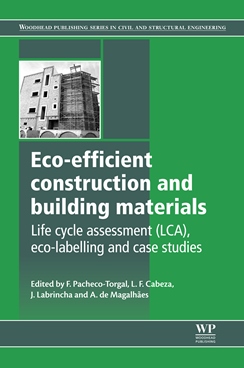Jan 6 2014
Determining the life cycle of eco-efficient construction materials is of critical importance to professionals in the construction industry. Life Cycle Assessment (LCA) is an assessment of the environmental impacts of a given material from cradle to grave. This book provides a thorough overview of the LCA and eco-labelling of eco-efficient construction and building materials.
Part one of the book provides an introduction to the environmental impact of construction and building materials, LCA, eco-labelling and procurement. This section also describes the use of LCA methodology in developing eco-labels for construction and building materials, outlines the EU Ecolabel scheme, and the Environmental Product Declaration (EPD) labelling of construction and building materials. Part two assesses the environmental impact of construction and building materials.

This section analyses the environmental impact of conventional and ‘green’ cement production, describes the LCA of concrete made using recycled concrete or natural aggregates, the LCA of building thermal insulation materials, phase change materials (PCMs), road pavement materials and wood-based building materials, and discusses the environmental impact of adhesives. Part three of the book assesses the environmental impact of particular types of structure. This section also covers the LCA of windows and window materials, ultra high performance concrete (UHPC) structures, and the LCA of fibre reinforced polymer (FRP) composites in civil applications.
Eco-efficient construction and building materials provides a comprehensive insight into all aspects of the life cycle assessment and eco-labelling of eco-efficient construction and building materials, and is an essential text for construction industry professionals, researchers, academics, post-graduate and under-graduate university students.
Fernando Pacheco-Torgal is an investigator in the C-TAC Research Unit at the University of Minho, Portugal, and is the author or co-author of more than 200 publications, including the edition of seven international books.
Luisa F. Cabeza is Professor at the University of Lleida (Spain) where she leads the GREA research group. She has co-authored over 100 journal papers and several book chapters.
João Labrincha is Associate Professor in the Materials and Ceramics Engineering Department of the University of Aveiro, Portugal, and member of the CICECO research unit. He has registered 22 patent applications, and has published over 170 SCI papers.
Aldo Giuntini de Magalhães is a Professor in the Department of Materials Engineering and Construction at the Federal University of Minas Gerais, Brazil, and coordinates government research projects related to the area of Sustainable Buildings.
Eco-efficient construction and building materials (ISBN 978 0 85709 767 5) is published at £180.00/ US$295.00/ €215.00 (plus p&p) by Woodhead Publishing Limited, 80 High Street, Sawston, Cambridge, CB22 3HJ, UK. Tel: +44(0)1223 499140. Fax: +44(0)1223 832819. Email: [email protected].
Based in Cambridge, England, Woodhead Publishing is a leading international publisher of Materials and Engineering books.
Review copies of Eco-efficient construction and building materials and all other Woodhead Publishing Civil and Structural Engineering books are available on request. Free catalogues providing full details of our titles are available from Woodhead Publishing.